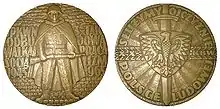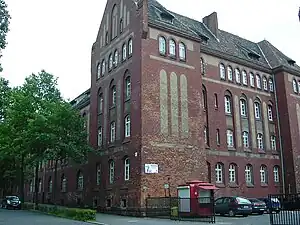| Internal Security Corps | |
|---|---|
| Korpus Bezpieczeństwa Wewnętrznego | |
| Active | 24 May 1965 - 1965 |
| Country | Poland |
| Type | Armed force |
The Internal Security Corps (Polish: Korpus Bezpieczeństwa Wewnętrznego, KBW) was a special-purpose military formation in Poland under communist government, established by the Council of Ministers on 24 May 1945.
History
 Commemorative Medal for the 20th Anniversary of the KBW |
 Emblem of the KBW Officer School |
The KBW consisted of 10 new cavalry regiments, an infantry division, and two buffer brigades. The corps itself was subordinate to the Ministry of Public Security. By the end of August 1945, its force was made up of 29,053 soldiers and 2,356 officers. The KBW was called forth to protect key public infrastructure such as railways, but mainly to combat and suppress the anti-Communist resistance in Poland, including activities of the "Cursed soldiers" as well as all organizations which continued their armed struggle against the Communist takeover, such as the Freedom and Independence (WiN), the National Armed Forces (NSZ), and the remnants of the Polish Home Army (AK) among others.[1]
Between 1945 and 1954, the KBW fell under the responsibility of Minister Jakub Berman of the Politburo, who was in charge of the Ministry of Public Security. Later, it was part of the Ministry of Internal Affairs. Between March 1945 and April 1947 alone, units of the KBW killed over 1,500 "Cursed soldiers", wounded 301, and apprehended 12,200 others.
In 1965, the KBW was renamed the Wojska Obrony Wewnętrznej ("Internal Defense Force"). It was included in the framework of National Defense. Also, in 1962, the Silesian Unit of the Engineering Army (KBW-4) built roads in the Bieszczady region in the extreme south-east of Poland, strategically important but an uninhabited area.
Commanding officers
- March 1945 – May 1945: Col. Henryk Toruńczyk
- Jun 1945 – September 1946: Gen. Bolesław Kieniewicz
- 1946–1948: Brigadier General Konrad Świetlik
- 1948–1951: Brigadier General Juliusz Hibner (born Dawid Szwarc)
- 1 March 1951 – 12 March 1965: Brigadier General Włodzimierz Muś
- 12 March 1965 – 1 July 1965: Brigadier General Bronisław Kuriata
See also
- Internal Troops – Soviet model for the Internal Security Corps.
- Ministry of Public Security of Poland
- Operation Vistula (1947)
- Zygmunt Bauman
References
- ↑ Władysław Tkaczew. Korpus Bezpieczeństwa Wewnętrznego. Bellona. pp. 111–112. ISBN 8311109400. Retrieved 4 June 2012.
{{cite book}}:|work=ignored (help)
